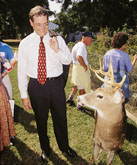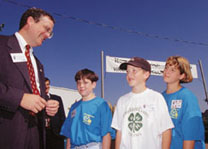
by Su Clauson-Wicker

Virginia Tech alumnus Dennis Treacy (fisheries and wildlife '78) was tapped by Virginia Gov. Jim Gilmore last spring to head the Department of Environmental Quality (DEQ), the agency where he started his career as a Tech co-op student.
It was a homecoming for Treacy to be among some of the people he'd met and come to respect two decades ago as a co-op student and as a new professional at the former Water Control Board.
But the bad news--and there was much more of that--was that DEQ was besieged with problems, not the least among them a bad public image and low morale. Only 18 months earlier, a state watchdog agency had accused the DEQ of being lax in monitoring water quality, sluggish in punishing polluters, and creating an atmosphere where employees distrusted management and feared retaliation for upsetting members of the regulated community.
Given such a state of affairs, what does a new director do?
All the governor asked of Treacy was to "stabilize the DEQ."
Treacy was named interim director in March and director in June, shortly after the death of former director Tom Hopkins. Within weeks, he administered the creation of several new divisions, including two non-regulatory divisions focused on preventing pollution and improving the
environment.
Treacy also began meeting with the various divisions and regional offices in the DEQ to "make sure they know we're all about doing the right thing here and that they feel valued," he says. He's upbeat about what he's seeing.
"I know most of the people in the agency, either from having worked with them 20 years ago or from working as their attorney for five years (in the attorney general's office). I know what type of professionals work in this office, and they're some of the best in the state."
Treacy leaves no doubt that the DEQ will be enforcing environmental regulations. "Jim Gilmore came out of the attorney general's office; so did the secretary of natural resources. They are great believers in enforcing the law."
"And that suits me just fine," he says.
Treacy also is an attorney and a veteran of a combined 8 years in the Virginia and West Virginia attorneys general offices. He earned his J.D. at the Northwestern School of Law at Lewis and Clark University in 1983, selecting the school for its top rating in environmental law.
Treacy is no radical, but he's not ultraconservative either. His most regular hobby is the Saturday night discussion he has with a 75-year-old friend on "religion, politics, all the things you're not supposed to talk about."
"My philosophy is usually right down the middle," says Treacy. "I'm just entertained by everybody's view."
Treacy has remained in the environmental field, despite opportunities to go elsewhere, he says. Three times he has forayed into the private sector: in his recent position monitoring legislation for a waste management company, as vice president of a consulting firm, and as attorney for a Richmond law firm.
"They each gave me a dose of the practical side of life," he says.
Five weeks after Treacy became director, he announced the restructuring of the DEQ's central office. The re-organization created expertise centers for air, water, and waste programs, as well as two new nonregulatory divisions that are largely voluntary: the Environmental Enhancement Division and the Pollution Prevention and Compliance Assistance Division.
The first contains the Chesapeake Bay Program, the waste tire program, and litter/recycling program. The latter, he says, "will work aggressively with the public to identify strategies to prevent pollution before it is created." A number of companies and organizations are willing to mentor others in developing plans to reduce pollution, and the DEQ will act as a clearinghouse for such relationships.
About 2,165 miles of Virginia's streams do not meet water quality standards. Treacy says regular planning and monitoring programs have already started to better define where these waters are impaired and why.
| The DEQ, he says, joins other states in making the shift away from point-source pollution (pollution that comes out of pipes) and more into nonpoint sources, such as urban runoff, overflow from sewers, and agricultural sources. They are working with other agencies to disseminate information about best management practices to farmers. |
 |
| DEQ Director Dennis Treacy chats with Goochland County 4-H youths working at a water-quality exhibit at the state fair. |
Some violators of DEQ regulations are making reparations through the new supplemental environmental program, which allows companies to substitute activities that benefit the environment for up to 75 percent of the fine. One such company is creating a waterfowl refuge on the James River.
"Air pollution will become more and more a source of concern as the EPA's more stringent regulations are enacted," he predicts. "Stricter controls will likely come to Roanoke and Winchester, as well as Tidewater and Northern Virginia. It's going to be tough. It's our job to facilitate a nice transition to the new regulations."
When something--like the DEQ website--excites Treacy, you can still see the baby-faced youth who came to Tech from Huntington, W.Va., 25 years ago. "It's really cool," he says. "See the way the river flows in our logo." Last summer he hired a 16-year-old with Internet savvy to jazz up the site--now it pulses and flows.
Treacy is somewhat less excited about the milk snake he is handed while representing the agency at the Virginia State Fair--all part of a typical day that includes dedicating a Water Wizard educational van, chatting with 4-H youngsters, and examining a remote control deer at the Natural Resources' exhibit at the fair.
Much of the day, however, is spent in more formal meetings. On a hot September afternoon, he's huddled within a cooling circle of fans with members of the litter-prevention staff as they give him a synopsis of the agency's litter-prevention and recycling activities for the past 30 years.
Treacy has a comfortable presence, relaxed, yet extremely attentive. Occasionally, he interjects with a big-picture question, such as "So who's the thinker here now?" and "What's the measure of success?"
At 4 p.m., as he moves to his next meeting, Treacy casually observes that he hasn't had lunch yet, and that he probably won't for another five or six hours, until he goes home and finds leftover dinner in the oven. "That's how it usually goes around here," he sighs.
When Treacy first began co-oping at the Water Control Board, his experience was less hectic. He'd fish for bass in the James every afternoon after work. But fishing wasn't all he did, and his Tech Cooperative Education counselor, Tommy Tate, was impressed enough to predict: "You're going to do great things, Mr. Treacy."
"In those days," Treacy says, "everyone used to envy me for working at the Water Control Board. That's my goal for the agency now. I want employees to be able to go to parties and be proud of what they do. In the past years--and I've been in this situation myself--people have believed they needed to apologize for working here."
Treacy lives with his wife, Donna, and two children, Matt, 12, and Sarah, 7, on a 17-acre farm in Hanover County, where they are raising eight chickens, three rabbits, and an emu.
Back to Features
Home | News | Features | Research | Philanthropy | President's Message |Alumni | Classnotes | Editor's Page